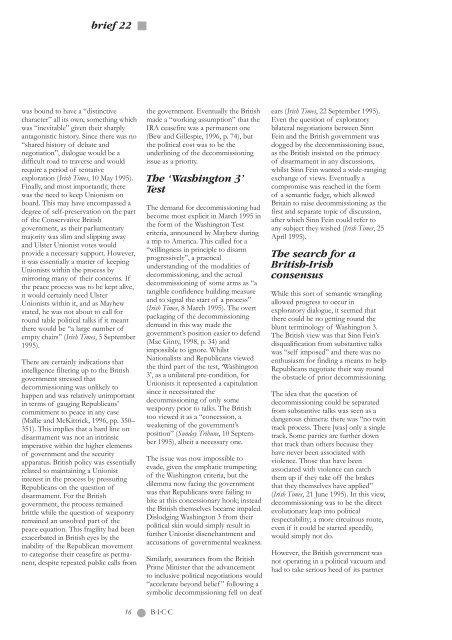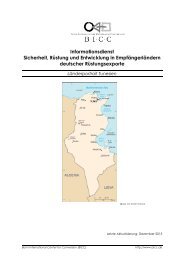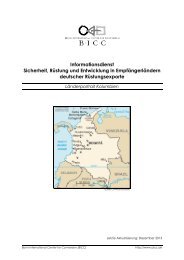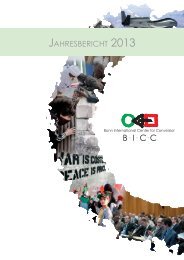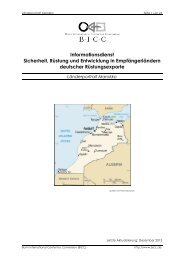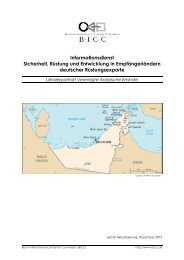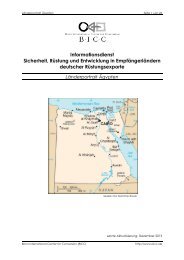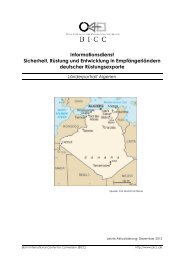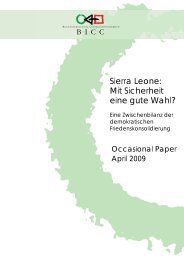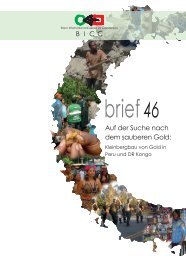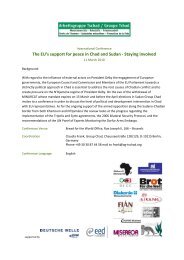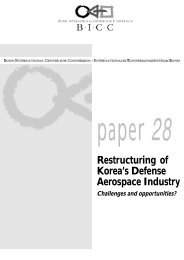English - BICC
English - BICC
English - BICC
You also want an ePaper? Increase the reach of your titles
YUMPU automatically turns print PDFs into web optimized ePapers that Google loves.
ief 22<br />
was bound to have a “distinctive<br />
character” all its own, something which<br />
was “inevitable” given their sharply<br />
antagonistic history. Since there was no<br />
“shared history of debate and<br />
negotiation”, dialogue would be a<br />
difficult road to traverse and would<br />
require a period of tentative<br />
exploration (Irish Times, 10 May 1995).<br />
Finally, and most importantly, there<br />
was the need to keep Unionism on<br />
board. This may have encompassed a<br />
degree of self-preservation on the part<br />
of the Conservative British<br />
government, as their parliamentary<br />
majority was slim and slipping away<br />
and Ulster Unionist votes would<br />
provide a necessary support. However,<br />
it was essentially a matter of keeping<br />
Unionists within the process by<br />
mirroring many of their concerns. If<br />
the peace process was to be kept alive,<br />
it would certainly need Ulster<br />
Unionists within it, and as Mayhew<br />
stated, he was not about to call for<br />
round table political talks if it meant<br />
there would be “a large number of<br />
empty chairs” (Irish Times, 5 September<br />
1995).<br />
There are certainly indications that<br />
intelligence filtering up to the British<br />
government stressed that<br />
decommissioning was unlikely to<br />
happen and was relatively unimportant<br />
in terms of gauging Republicans’<br />
commitment to peace in any case<br />
(Mallie and McKittrick, 1996, pp. 350–<br />
351). This implies that a hard line on<br />
disarmament was not an intrinsic<br />
imperative within the higher elements<br />
of government and the security<br />
apparatus. British policy was essentially<br />
related to maintaining a Unionist<br />
interest in the process by pressuring<br />
Republicans on the question of<br />
disarmament. For the British<br />
government, the process remained<br />
brittle while the question of weaponry<br />
remained an unsolved part of the<br />
peace equation. This fragility had been<br />
exacerbated in British eyes by the<br />
inability of the Republican movement<br />
to categorise their ceasefire as permanent,<br />
despite repeated public calls from<br />
the government. Eventually the British<br />
made a “working assumption” that the<br />
IRA ceasefire was a permanent one<br />
(Bew and Gillespie, 1996, p. 74), but<br />
the political cost was to be the<br />
underlining of the decommissioning<br />
issue as a priority.<br />
The ‘Washington 3’<br />
Test<br />
The demand for decommissioning had<br />
become most explicit in March 1995 in<br />
the form of the Washington Test<br />
criteria, announced by Mayhew during<br />
a trip to America. This called for a<br />
“willingness in principle to disarm<br />
progressively”, a practical<br />
understanding of the modalities of<br />
decommissioning, and the actual<br />
decommissioning of some arms as “a<br />
tangible confidence building measure<br />
and to signal the start of a process”<br />
(Irish Times, 8 March 1995). The overt<br />
packaging of the decommissioning<br />
demand in this way made the<br />
government’s position easier to defend<br />
(Mac Ginty, 1998, p. 34) and<br />
impossible to ignore. Whilst<br />
Nationalists and Republicans viewed<br />
the third part of the test, ‘Washington<br />
3’, as a unilateral pre-condition, for<br />
Unionists it represented a capitulation<br />
since it necessitated the<br />
decommissioning of only some<br />
weaponry prior to talks. The British<br />
too viewed it as a “concession, a<br />
weakening of the government’s<br />
position” (Sunday Tribune, 10 September<br />
1995), albeit a necessary one.<br />
The issue was now impossible to<br />
evade, given the emphatic trumpeting<br />
of the Washington criteria, but the<br />
dilemma now facing the government<br />
was that Republicans were failing to<br />
bite at this concessionary hook; instead<br />
the British themselves became impaled.<br />
Dislodging Washington 3 from their<br />
political skin would simply result in<br />
further Unionist disenchantment and<br />
accusations of governmental weakness.<br />
Similarly, assurances from the British<br />
Prime Minister that the advancement<br />
to inclusive political negotiations would<br />
“accelerate beyond belief ” following a<br />
symbolic decommissioning fell on deaf<br />
16 B·I·C·C<br />
ears (Irish Times, 22 September 1995).<br />
Even the question of exploratory<br />
bilateral negotiations between Sinn<br />
Fein and the British government was<br />
dogged by the decommissioning issue,<br />
as the British insisted on the primacy<br />
of disarmament in any discussions,<br />
whilst Sinn Fein wanted a wide-ranging<br />
exchange of views. Eventually a<br />
compromise was reached in the form<br />
of a semantic fudge, which allowed<br />
Britain to raise decommissioning as the<br />
first and separate topic of discussion,<br />
after which Sinn Fein could refer to<br />
any subject they wished (Irish Times, 25<br />
April 1995).<br />
The search for a<br />
British-Irish<br />
consensus<br />
While this sort of semantic wrangling<br />
allowed progress to occur in<br />
exploratory dialogue, it seemed that<br />
there could be no getting round the<br />
blunt terminology of Washington 3.<br />
The British view was that Sinn Fein’s<br />
disqualification from substantive talks<br />
was “self imposed” and there was no<br />
enthusiasm for finding a means to help<br />
Republicans negotiate their way round<br />
the obstacle of prior decommissioning.<br />
The idea that the question of<br />
decommissioning could be separated<br />
from substantive talks was seen as a<br />
dangerous chimera: there was “no twin<br />
track process. There [was] only a single<br />
track. Some parties are further down<br />
that track than others because they<br />
have never been associated with<br />
violence. Those that have been<br />
associated with violence can catch<br />
them up if they take off the brakes<br />
that they themselves have applied”<br />
(Irish Times, 21 June 1995). In this view,<br />
decommissioning was to be the direct<br />
evolutionary leap into political<br />
respectability; a more circuitous route,<br />
even if it could be started speedily,<br />
would simply not do.<br />
However, the British government was<br />
not operating in a political vacuum and<br />
had to take serious heed of its partner


